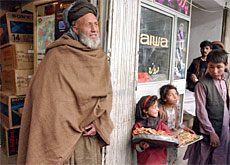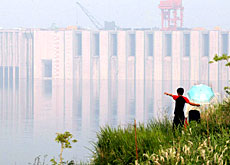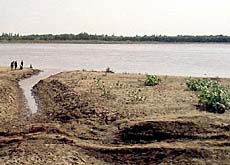Experts consider how to transform war economies

A conference in Bern has discussed ways of preventing and ending the financial dependency on war in some parts of the world.
Swiss and international experts agreed that the problem could only be tackled by creating political and economic stability in the countries concerned, and involving grassroots and international actors.
Participants considered the example of Afghanistan where the transformation of the economy is proceeding slowly after 20 years of war.
The one-day event was organised by the Swiss Agency for Development and Cooperation (SDC) and the Swiss Peace Foundation, swisspeace.
swisspeace director Laurent Goetschel defined the term “war economy” as a set of economic structures that arise from armed conflicts and that may continue to exist even after the violence has ended.
“[A war economy] has to do with making money out of a war system rather than out of a peaceful situation,” Günther Baechler, SDC head of Conflict Prevention and Transformation, told swissinfo.
Conflict prone areas
War economies occur not only in countries where conflict has already broken out but also where a conflict is about to erupt.
The regions with the highest number of war economies are Sub-Saharan Africa – the Democratic Republic of Congo [DRC], Liberia, Sierra Leone and Angola – Southeast Asia and the Middle East.
A long history of conflict, civil war and wars of independence have prevented some countries in these regions from establishing a normal economy and introducing democracy.
“It has to do with the failure of a specific state, of a government, of a nation-building process [and] maybe with some international interference too,” Baechler explained.
According to Baechler, most of these wars are an elite-driven struggle for power and for control over natural and non-renewable resources – oil, timber, diamonds and gold.
War economies are more likely to develop in African countries – and Sub-Saharan Africa in particular – because of their dependence on natural resources, low income levels and low growth in income, explained Paul Collier, professor of economics at the University of Oxford.
Reducing these risk factors, Collier said, was the only way to improve the situation, transform war economies into peace economies and establish lasting peace.
Durable peace
A durable peace and sustainable development could only be secured if a country was economically, socially and politically stable, SDC director Walter Fust told the meeting.
The participants agreed that the transformation of war economies into peace economies was a feasible long-term goal if certain steps were taken, notably the re-establishment of power and taxation, and the demobilisation of rebel groups.
Susanne Schmeidl, the swisspeace representative in Afghanistan, said that the destabilisation there since the takeover of the interim government in 2001 was partly due to President Hamid Karzai’s failure to implement these steps.
“Karzai has lost a lot of legitimacy… because his government has not managed to get the monopoly in taxation or to push forward a meaningful disarmament, demobilisation and reintegration [programme].”
Experts were also agreed that war economies could only be successfully transformed with the involvement of governments, international NGOs and private actors at a local, national and international level.
“You can do it from a global perspective, dealing with norms and standards, with tracing and tracking and also with certificates – like the Kimberley process in the case of diamonds – but you can also enter at a local level, trying to deal with local people to build up their own environment,” Günther Baechler said.
Success stories
Schmeidl also emphasised the importance of involving local actors, describing area programmes organised by the Afghan Civil Society Forum as small success stories.
She added that two and a half years of reconstruction help could not work wonders in Afghanistan – a war-torn country for over 20 years – but that steady steps would help improve the situation.
Baechler said Switzerland, with its long humanitarian tradition, was playing an active role in helping transform war economies and in peace building through promoting human rights and development cooperation.
swissinfo, Katalin Fekete
The regions most affected by war and conflicts are Sub-Saharan Africa, Southeast Asia and the Middle East.
These regions also have the highest incidence of war economies – defined as the economic structures arising from an armed conflict situation.
Conflicts in these regions are caused by dependence on natural resources, and both the low level and low growth rate of income.
The conference “Transforming War Economies” took place on September 15, 2004.
It was co-organised by the Swiss Agency for Development and Cooperation (SDC) and swisspeace.
Presentations and discussions showed that the problem of war economies could only be tackled by stabilising countries politically, socially and economically, and by involving actors at all levels.

In compliance with the JTI standards
More: SWI swissinfo.ch certified by the Journalism Trust Initiative











You can find an overview of ongoing debates with our journalists here . Please join us!
If you want to start a conversation about a topic raised in this article or want to report factual errors, email us at english@swissinfo.ch.